Fantasy abounds with daring young people who study magic on their own, expanding their grasp with bold experiments into fields they only poorly understand. Fantasy also abounds with sensible young people who, perhaps observing the scorch marks left behind by daring autodidacts, have found experienced elders to guide them past dangers of which novices are unaware.
Sometimes the students make do with a single mentor. Sometimes an entire educational institution is available. Sometimes the students chose their mentor. Sometimes the mentor chooses them. As these five works show, this seemingly simple arrangement lends itself to a wide variety of tales.
Charmed Life by Diana Wynne Jones (1977)
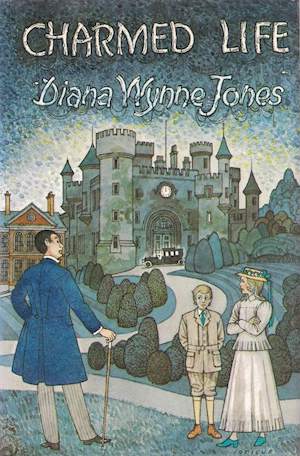
Magic saved Gwendolen and Eric “Cat” Chant from the boating accident that left them orphaned. Certified Witch Mrs. Sharp does her best to mentor Gwendolen. Ambitious Gwendolen sees no reason to settle for Mrs. Sharp when senior mage Christopher Chant is Gwendolen’s blood relative. The ambitious girl wastes little time inveigling an invitation out of Chant.
Much to Gwendolen’s irritation, life with Chant is not the shortcut to power and fame she expected. Chant proves all too adept at spotting misuse of magic. Viewing rules as something that apply to other people, Gwendolen decamps to another world, leaving her doppelgänger Janet in her place. It falls to magic-less Janet and timid Cat to save the world from the consequences of Gwendolyn’s grand schemes.
If I were assembling a list of authentically terrible relatives, Jones’ books might provide all the examples I might want. In this case, Christopher Chance is a bit too much of a hands-off mentor, allowing certain situations to develop longer than he should. However, this minor flaw in his character pales next to the flaws of Gwendolen, whose spoiled exterior conceals a truly villainous core.
Vita Nostra by Marina and Sergey Dyachenko (2007)
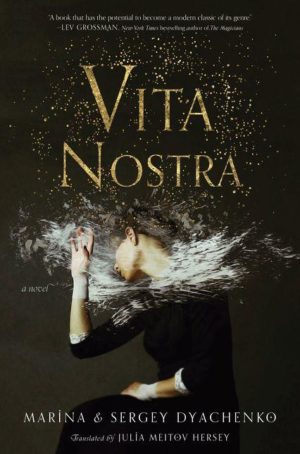
Sixteen-year-old Sasha Samokhina has potential few others can match. Farit Kozhennikov urges her to embrace it. Indeed, he gives Sasha very little choice in the matter. Declining her educational destiny will result in catastrophe. Farit is convincing on this point.
Farit enrolls Sasha at the obscure Institute of Special Technologies. Her courses are traumatizing. But the consequences of failure are even worse—no choice but to press on, no matter how unwelcome the knowledge or alarming the effects of learning it on Sasha. With time, Sasha will learn to love the work that chose her.
Farit might not call what is being taught “magic.” Think of it as extremely advanced applied linguistics. Readers, on the other hand, will probably think of it as magic, if they don’t opt for cosmic horror. Nevertheless, once the abyss has stared into Sasha long enough, she no longer wants to escape.
The Bone Witch by Rin Chupeco (2017)
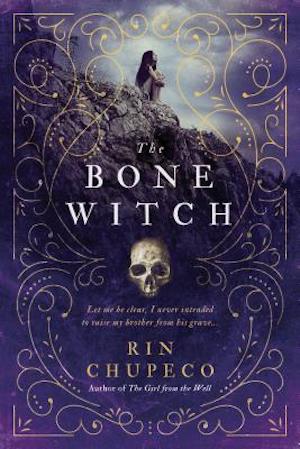
When Tea’s brother Fox dies, a grief-stricken Tea discovers she has a talent for necromancy. She cannot bring her brother back to life. To her enormous surprise, she can rekindle his consciousness and grant him a mobile body. Tea is a bone witch.
Veteran bone witch Mykaela of the Hollows intervenes to save Tea from the dangers of amateur necromancy. Under Mykaela’s tutelage, Tae can become a respected, credentialled bone witch. All Mykaela asks in return is a few years of indentured servitude from Tea. Too bad that one of the side effects of using bone magic is a truncated lifespan.…
Tea’s society believes passionately that people, especially expendable people, should stick to their assigned roles (At least Tea won’t be drafted as a soldier or, as people call them, “deathseekers”). Too bad that one excellent way for a bone witch to convince her betters that she might have gone over to the dark side is to agitate for social reform.
The Marvellers by Dhonielle Clayton (2022)
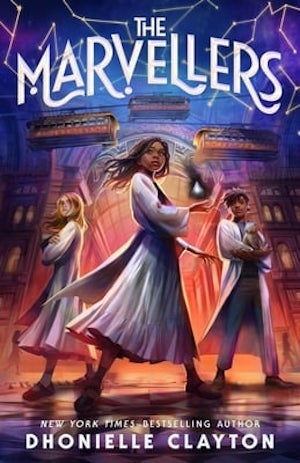
The Arcanum Training Institute is the paramount centre for magical education. If asked, the administration would assert they select students purely on merit. Their inclusiveness has limits: conjurors are deemed too close to the underworld to admit. At least until very recently.
Ella, the very first conjuror to attend Arcanum Training Institute, has gained admission thanks to a lawsuit (mounted by her father). Forced to accept Ella, Arcanum provides her with valuable lessons. Not merely about magic. Ella learns how effectively a designated pariah can be isolated from the student body. She also discovers first-hand how diligent Arcanum’s administration can be at finding pretexts to punish and expel an unwanted student.
With few exceptions, the administration’s members are not a lovable lot. Many are steadfast bigots determined to roll back social progress. Unlike certain other series I could mention, the novel does not portray these efforts sympathetically.
The Very Secret Society of Irregular Witches by Sangu Mandanna (2022)
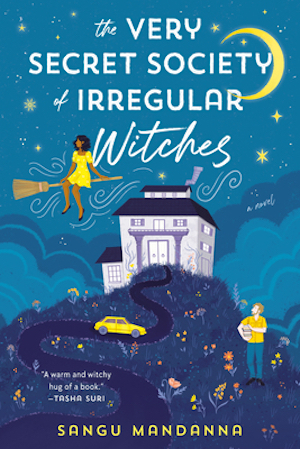
Witch Mika Moon enjoys teasing her mentor Primrose with displays of eccentricity. Despite this, Mika is diligent about following the rules that Primrose has drummed into her. Fearful of the consequences should witches be noticed by mundanes, Primrose is adamant that witches keep a low profile and that they avoid socializing with other witches. Mika yearns for companionship, thus her online videos in which Mika pretends to be an obviously fake witch.
Ian Kubo-Hawthorn sees through the fake witch costume to the real witch beneath. Enticed to Nowhere House1, Mika discovers a magically veiled mansion, home to three child witches who desperately need the tutoring Mika can offer. Mika for her part finds the companionship of Nowhere House’s staff welcome. Alas, Mika’s new friends have held back important information, not least of which involves the corpse hidden in the garden.
The most notable element of this novel is the general lack of antagonists. Even the bigoted lawyer who complicates matters is only trying to pursue his client’s best interests, a client who happens to own Nowhere House. As the novel reveals, one doesn’t necessarily need a Big Bad as such. Bad luck and poor communication will suffice to drive a plot.
***
There are any number of works I could have mentioned here (alas, no room). If I’ve overlooked any fictional mentors or schools that you hold dear, please mention them in comments, which are as ever, below.
In the words of fanfiction author Musty181, four-time Hugo finalist, prolific book reviewer, and perennial Darwin Award nominee James Davis Nicoll “looks like a default mii with glasses.” His work has appeared in Interzone, Publishers Weekly and Romantic Times as well as on his own websites, James Nicoll Reviews (where he is assisted by editor Karen Lofstrom and web person Adrienne L. Travis) and the 2021 and 2022 Aurora Award finalist Young People Read Old SFF (where he is assisted by web person Adrienne L. Travis). His Patreon can be found here.
[1]I don’t have room to cram it into the main text but: Mika has a cunning method of enabling her car to get her from A to B faster than one would expect from a car (no matter the model).











There’s a series set in the U.K. late in the last century where the headmaster of the magic school is so focused on defeating the Big Bad at any cost that one of the few competent teachers turns out to be working for the Big Bad.
The Tamora Pierce Circle of Magic quartet is about four young mages being mentored in their specialty. The sequel The Circle Opens quartet features those young mages, now more advanced in their study, teaching younger students.
The Guildmaster series by C E Murphy features a world in which there is a guild for each major type of magic, and apprentices in the guild learn their craft from journeymen and masters. While our main characters have adventures of various sorts.
Aunt Maria, and Archer and siblings leap to mind.
Do I really need to mention Lev Grossman’s memorable Magicians trilogy?
Why, yes I do. (Best Hogwarts/Narnia takedown ever, IMO, and they both needed it.)
Several of Pterry’s books cover this topic. There’s Equal Rites, Sourcery, Carpe Jugulum, and the Tiffany Aching books for starters.
And inevitably, someone in the comments will mention the scribblings of She Who Must Not Be Named that concern a school named after porcine skin disfigurations.
Of course, there’s one award-winning book that has BOTH a single mentor and a school.
Charmed Life infuriated me.
Gwendolen breaks rule after rule, going farther and farther each time. No matter how outrageous her behavior, she faces zero consequences. Christopher Chant only responds by fixing the damage. The only thing this magical school seems to accomplish is teaching a magic user to become a dangerously psychopathic magic user.
Charmed Life is the only Diana Wynne Jones book I’ve attempted, but refused to finish.
I do like the supervised self-study set up of Diane Duane’s Young Wizards series. You get your assigned mentor to keep you, if not out of trouble, at least to minimize the damage; and you study what you want when you want and are ready for it. Seems to work very well.
7: In Chant’s defence, Gwendolen was already a dangerously psychopathic magic user when he first met her.
I do like that we are all carefully avoiding summoning an enchanter
I enjoyed the heck out of Naomi Novikl’s Scholomance series. The main character has the goods to be a truly horrifying wicked witch, but she doesn’t want to. The school itself has a bad habit of eating the unprepared or incautious, and the basis of magic is nasty in and of itself.
Same vein but for younger readers is Ursula Vernon’s Castle Hangnail. Molly thinks being an evil sorceress and taking care of the titular castle would be wonderful, even if she’s only 12.
The Kane siblings in Throne of Fire by Rick Riordan run Brooklyn House, where they train young magicians to harness the powers of Egyptian gods. It’s an interesting blend of classroom instruction and DIY which seems to work. (Personally, I’d rather hole up in the Library with Cleo than face a horde of cheese demons, but I suspect I’m in the minority here.)
I wish we’d gotten more stories of actual magic instruction at Chrestomanci Castle… oh well. Shoutout to fellow Diana Wynne Jones fans, and thanks to everyone for the rec’s!
Zen Cho’s Sorcerer to the Crown (2015) has a terrible magical school and a good example of a mentor. The school is terrible because it’s basically aimed at crushing the talents of witches, and the Sorcerer Royal has problems because England is running out of magic and the Fairy Court won’t supply more. Fortunately he’s conned into becoming mentor to Prunella, one of the school’s students, and together they solve the problem…. There’s a lot more to it, of course, including some racism which really doesn’t help matters, but in the end matters are resolved. The sequels are pretty good too.
The magicians in the Sorcery and Cecilia books (Patricia Wrede and Caroline Stevermer) seem to have a variety of methods, but we see them primarily taught by mentors. An overarching magic organization is mentioned, but it’s not clear if a school is attached.
Jupiter North in the Nevermoor series is an example of a flawed teacher but generally good mentor who’s contrasted against Squall/the Wundersmith as an effective teacher but a predictably terrible mentor, and the School of Wundrous Arts is – well, it’s an institution, and therefore fundamentally flawed at a level that impacts Morrigan directly and the other members of her cohort indirectly, not to mention the rest of the Free State’s society. As for Morrigan’s main teachers there…Dearborn looks like the absolute stereotype of a good, loveable teacher and turns out to be prejudiced, hidebound and actively bad for Morrigan in particular; Murgatroyd looks like the stereotype of a sadist teacher but is the only one who’ll stand up for Morrigan’s right and need to learn; and Rook is barely even there and doesn’t actually teach but still arranges for Morrigan to learn more than any of the others bar Squall.
All in all, Nevermoor has a complicated position on teachers, and seems to favour self-directed learning with good mentors if you’re an unusual case like Morrigan is.
Really? No one’s mentioned Merlyn from The Once and Future King, one of the iconic magical mentors who uses magic to teach a young boy named Wart? I’m pretty sure plenty of writers have been inspired by him.
The first few books of Robert Asprin’s Myth Adventures series has one main character, the Pervert Pervect (being from the dimension Perv) Aahz serving as mentor to Skeeve. The twist is that, due to a prank by Aahz’s friend Garkin, Skeeve’s previous master, Aahz has lost the ability to do magic, and Garkin was assassinated right after summoning Aahz.
15: I suppose mutant powers are more sciency than magic but otherwise Professor X is a nice example of a flawed teacher. He takes kids, each with unique abilities and needs, and turns them into soldiers to show the world mutants are OK. Mutants with non-fighty abilities sometimes fair poorly despite having otherwise useful talents. RIP Doug Ramsey….
@6
Let me tell y’all a story ’bout a man named Ged
A poor Gontishman barely kept his otak fed
Then one day he was working on a spell
And up from the earth came a critter out of hell!
Darkness Dude. Gebbeth Guy.
Well, the next thing you know old Ged is on the run
Serret says “let’s rock” but Old Powers ain’t no fun
Now at this point the rhyme scheme’s gotten kind of strained
But don’t y’all have a cow ’cause equilibrium’s maintained!
The Craft sequence by Max Gladstone centers around Tara Abernathy who is dominated by her teacher Professor Denovo, burns down his laboratory, is, literally, thrown out of magical school and then rescued, hired and mentored by Elayne Kavarian, a rival of Denovo’s.
The books develop a novel mythos and achieve the unlikely goal of making contract law look exciting.
I liked the Paper Magician series by Charlie N. Holmberg.
The dynamic between student and teacher is quite predictable, but the books are actualy enjoyables.
Another interesting book is Uprooted, by Naomy Novik;
The teaching component is just minor in the balance of the book, but the book is actually a good one
@7: ISTM that adults not realizing for most of a book how psychopathic a child is has been a trope for a long time. (This holds even when the adults aren’t deliberately letting the children discover their inner monsters as in the frame of The Silver Chair.) And whoever holds the title of Chrestomanci tends to have a lot on his mind — which is usually more skilled at magic than at people (another trope). Given this, the twist ending (that Gwendolen is really a magic ~vampire rather than having magic of her own) seems plausible and earned; YMMV.
Joyce Harmon has a charming series that begins with MARY BENNETT AND THE BINGLEY CODEX about how she stumbled across a magical book which *liked* her, and how she became acquainted with the other British witches and wizards (she only wanted it to make it rain a bit, had no intention of causing drought for the rest of England…). It’s excellent fantasy matched with P&P pastiche.
Considering the many hours of joyful reading that I am confident the vast majority of Tor readers received from the series, I think we would be remiss in not expressly mentioning the wonderful Harry Potter series by the brilliant J.K Rowling. The Dumbledore and Harry relationship was an excellent example of the magical mentor theme. Beyond that core relationship, there was a diverse range of other magical teachers that JK created for our reading pleasure – from the steadfast Professor MacGonagall to the conflicted Professor Snape to the egomaniacal Professor Lockhart. And the source material was so rich that many of the resulting movies were also a delight. Personally I reread them every seven years because — as we know — “seven is the most magical number”.
Hardly surprising that I’m not the first to mention the wizard ing school on Roke. Earthsea is probably even more influential on me than Middle-Earth.
I’d also sneak in a mention for Naomi Novik’s Scholomance series, though it’s signally lacking in wise old mages, or indeed mentors of any kind.
I have a soft spot for The Magic Grandfather by Jay Williams, but I’m not sure it’s so good that I’d suggest tracking down a copy.
@14, more directly on point is Mairelon the Magician and its sequel by Patricia Wrede.
Magic University in The Kingkiller series by P Rothfuss, and its rip-off magic university in the Poppy Wars book (only read the first one) by R F Kuang. What I liked about the magic lessons in the Kingkiller books is the idea of keeping opposing ideas in your mind simultaneously. Very good for critical thinkers.
The College of Magic by Caroline Stevermer – a very strange book where not much actually happens at the college.
Sort of magic being taught in Lois Bujold McMaster’s Penric’s Demon series, where he is taught and later teaches how to do magic such as making fire and ice. It’s kind of magic anyway.
@26: I remember The Magic Grandfather; in fact, I still have my childhood copy from the ’80s, although it’s currently in a box in the attic. I agree that it’s a relatively lightweight work, but I also remember it fondly.
I realized recently that several of the more memorable books that I read as a child (the Danny Dunn series, The Magic Grandfather, The Hero from Otherwhere, The Time of the Kraken) were all by Jay Williams; they are quite different works from one another, so I didn’t pay attention at the time to the fact that they were all by the same author.
In terms of schools of magic, as with many other people here, the School of Roke from A Wizard of Earthsea was perhaps the first example that I ever encountered, and certainly one that left a lasting impression.
I want to argue that Albus Dumbledore isn’t precisely a mentor. He’s interested in Harry Potter’s welfare, and he gives Harry some personal attention, but he spends most of his time running the school as a whole, and I don’t recall him teaching magic at all. On the other hand, a lot of the students hero worship him, they even set up a club named after him, and they talk a lot about what Professor Dumbledore may be thinking and doing. Still, I’d say Rubeus Hagrid, and Professor McGonagall and Professor Lupin, are more mentors – Hagrid perhaps is more a friend. And Hagrid sometimes misleads without intending to.
A brand-new example: Max Gladstone’s latest (and “first”) Craft novel, Dead Country. A lot of it is about coming to terms with one’s own issues growing up, but it’s also about someone who had very different plans for their life being a teacher for the first time. (We also get some discussion of the protagonist’s mentor, who she desperately wants not to emulate.) ISTM that practically everything listed above is primarily about the student mastering magic, rather than the mentor mastering teaching — but the latter has to happen, else where would mentors come from?
@28: in the sequel A Scholar of Magics, almost everything that happens happens at the college. It’s more about sussing out plots, but there’s some mentoring as well — perhaps more direct/useful than in College (which does have one of my all-time favorite lines: “Faris, your hat is ticking.”)
No one has mentioned Rainbow Rowell’s excellent Simon Snow series! Beginning with Carry On and continuing with Wayward Son and Any Way the Wind Blows, Rowell starts with a Hogwarts-like school and then starts playing, with excellent results. The headmaster of the school is definitely unreliable…. Hilarious and heartfelt and compulsively readable. I’m just going to say, go read it and thank me later.
I may be out of line for suggesting it, since the “powers” are not defined as “magic”, but, whether we draw on a “magic” outside of ourselves to affect the physical world, or whether we draw on a “superhuman power/magic” inside of ourselves to affect the physical world, could we agree, for the sake of discussing a fabulous set of books, if it works like magic, then, it’s magic …. if you’ll grant me that, I’m so pleased to offer for your consideration Drew Hayes’ Superpowereds series as one of the most interesting series on teaching youths to use their powers I’ve ever encountered. And, interestingly, the school for teaching these youths how to use their superpowers is hidden in a regular everyday university, just many, many levels underground. Drew Hayes, the author, has been incredibly generous with the stories’ lengths … each of the books is hundreds of pages, and the each one of the 5 audiobooks in the series is over 20 hours in length, and the story lines mesh and intersect and keep adding more and more fascinating characters that create a huge ensemble piece of young people learning how to safely, and positively, use their powers, to do good in the world. It is an incredible, fascinating, uplifting, intriguing, delightful series, filled with people you’ll actually like.
The safest way to learn and be taught magic is to try and avoid lessons. Something the faculty and student body of the Unseen University of Ankh-Morpork understands intimately.
Despite that, Arch-chancellor Ridcully and Ponder Stibbons seem have developed a mentor /mentee relationship, possibly because neither has much idea of what the other is going on about most of the time…
The safest way to learn and be taught magic is to try and avoid lessons. Something the faculty and student body of the Unseen University of Ankh-Morpork understands intimately.
The faculty of Unseen University regarded teaching as a process in which one placed a large number of students in proximity to a large number of books, in the hope that something valuable would pass from one to the other. The students themselves, meanwhile, placed themselves in proximity to a large number of taverns, for very much the same reason.
Do I really need to mention Lev Grossman’s memorable Magicians trilogy?
Not really, I would say, because this is a post about magical teachers and mentors, and the Magicians books have very few of them. They only really feature in the first book of the trilogy and even then they aren’t very important to the plot. The difference is that it’s not a magical-British-boarding-school book, it’s a magical-US-elite-liberal-arts-college book, and the plot is therefore mostly about what the annoyingly droopy students get up to among themselves, not what they’re learning in class.
Charmed Life infuriated me.
Gwendolen breaks rule after rule, going farther and farther each time. No matter how outrageous her behavior, she faces zero consequences. Christopher Chant only responds by fixing the damage.
It’s a while since I read it, but from memory Chrestomanci punishes Gwendolen initially with child-appropriate penalties like being confined to her room, and then by stripping her entirely of her magical abilities. That is a major consequence that drives plot for the rest of the book.